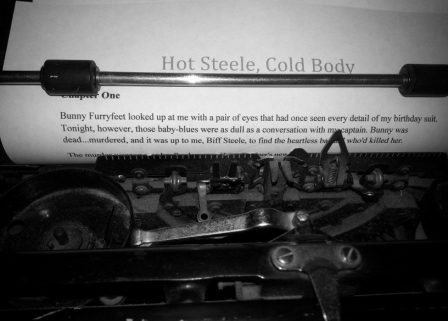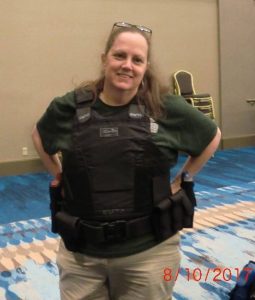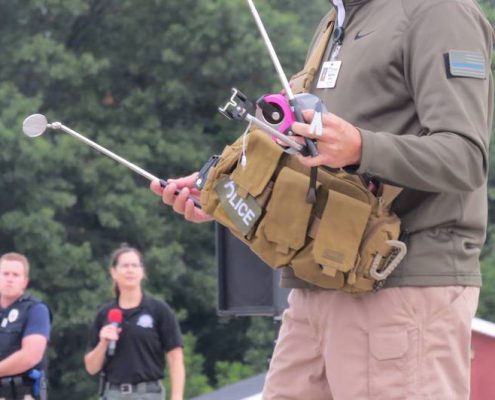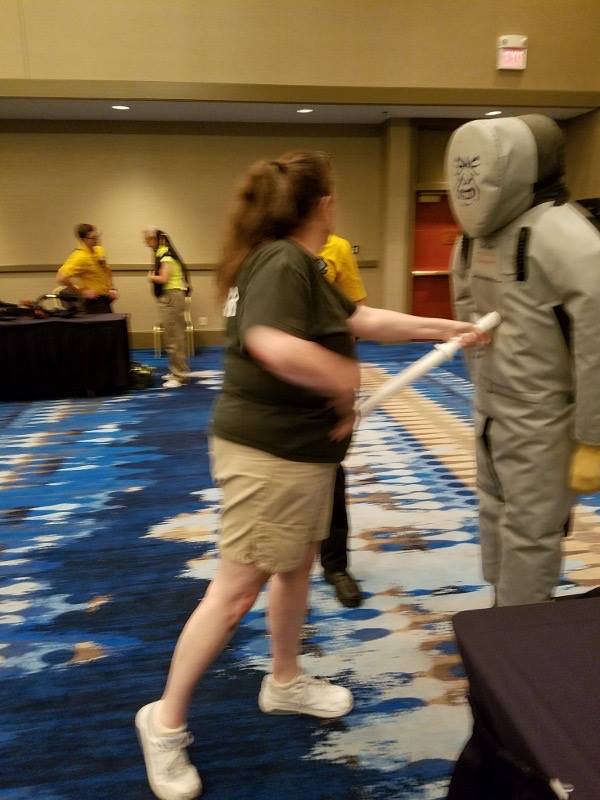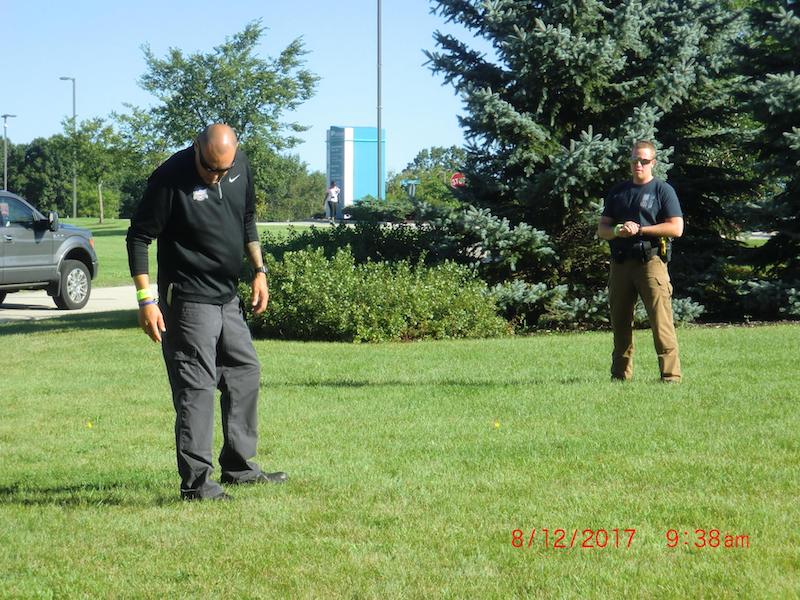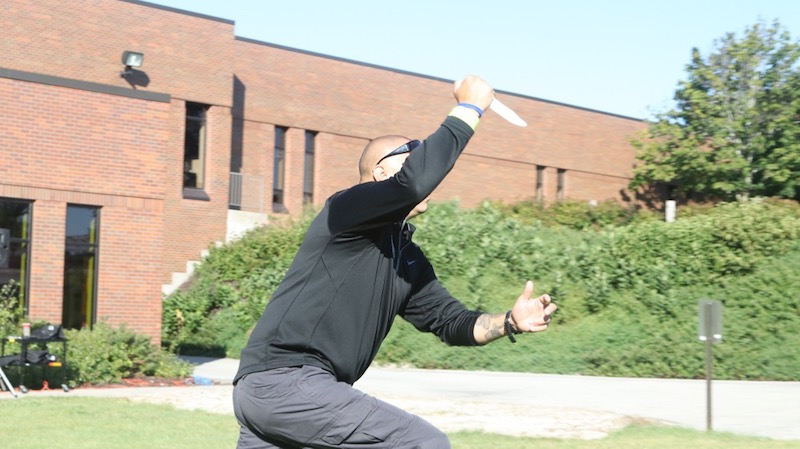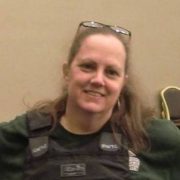Detective I. M. Manly here, and I’ve stopped by today to tell you about a serious situation concerning today’s protagonists.
We, the heroes of your stories, have attended numerous meetings in secret, trying to figure out ways to put an end to the torture you force us to endure. For example, and this is indeed a sad, sad, case. I ran into Biff Steele a few days ago and within a matter of seconds I knew I’d caught him at a weak moment.
He’d barely spoken two sentences when his emotions came spilling out. Right there on the sidewalk in front of the Piggly Wiggly, for everyone to see, including Pastor Ben Theredunthat who went inside to purchase a tin of foot powder for his wife. On the way out he offered a quick blessing, an act Biff sorely needed at that moment. Pitiful is what he was, I’m here to tell you.

I. M. Manly looking especially tough on the set of his new film, “Attack of the Killer Typewriters,” a gripping thriller based on the book of the same title.
Biff is typically a tough-as-nails protagonist. He rolls with the punches and quite often delivers a few hay-makers of his own. But on this day, Biff was pretty far down in the dumps. He was feeling lower than a snake’s belly in a wagon rut. Feeling blu … Well, you get the idea.
I asked him why he was sporting such a long face. His response was stunning.
He said he’d had about all he could take from his writer. She’d stopped conducting any real research and subsequently turned to the internet where she mined tons of crappy information. Then Biff paused a second before delivering the really big bombshell. He said he was thinking about leaving, maybe even killing himself off in the final pages of the next book.
I couldn’t believe it. Not Biff Steele! I asked what, if anything, could be done to make things right again. That’s when he told me everything. Then, shaking like a leaf on a tree during a hurricane, he drove straight home to confront his writer.
A few weeks later, while attending a popular convention for writers, Biff told a concerned group of protagonists that when he arrived home after unloading his burdens on me, he burst through the front door and found his writer sitting at the typewriter clacking away. He said his creator seemed irritated with the interruption but he started his rant anyway.
This, she said, is what Biff told yelled at his writer.
1. Quit having me smell the odor of cordite at crime scenes. For goodness sake, I’m not that old. Actually, even my parents hadn’t been born when they stopped making that stuff. No. More. Cordite!
2. I love tense moments in stories as much as the next character, but having me kidnapped in every other book? Come on, you know me better than that. Me getting abducted so often makes me look weak. And, quite frankly, a bit stupid.
3. Don’t you remember the discussion we had the last time you had me draw a chalk outline around a dead body? Oh, it’s coming back to you now … That’s right, they don’t do that anymore! Yep, doing so could destroy or alter evidence. Geez … pay attention.
4. For the last time, the FBI does not have the authority to take over my murder cases, my office, or my entire department. Stop sending them into my scenes!
5. Speaking of the FBI … NO, they don’t investigate all kidnapping incidents. So please let me solve my own cases. Your friends stopped writing that garbage years ago and their heroes are looking pretty sharp because of it.
6. So you insist upon writing me as a stupid, bumbling, idiotic clown who can barely find my way home at night, huh? Well, you’re showing a lack of knowledge there, Sunshine. You are aware that I had to pass a ton of tests and show an outstanding ability to solve crimes in order to land the promotion to detective, right? It’s not a job for dummies. Tell me, what are your qualifications that make you an expert on my career?
7. Let’s do this one more time. My sidearm is a Glock semi-automatic. It does NOT have any type of safety that I can “thumb-off.” No Way. No How.
8. Remember book three, back when I carried a revolver, a Chief’s Special? Think hard. Yes, that’s the one. Now think about the scene on page 87 where you MADE me say, “The sunlight reflected hotly from the brass casings as they automatically ejected from my revolver?” Remember that? Well, to this day I’ve never lived it down. Reacher and Bosch and the other guys bring it up all the time, and it’s embarrassing. Why, just the other day I overheard sweet little Kinsey Millhone cracking a joke about it. For the last time, revolvers do NOT automatically eject spent cartridges. I have to push them out manually, using the extractor rod.
9. While we’re on the subject of Kinsey, why can’t I have a steady girlfriend? You know, someone nice, like her? I’m pretty tired of living alone and drinking by myself in dark, dreary bars. I want to have some fun for a change. What don’t you ever let me go dancing, or to a movie? Anywhere where I don’t end up fighting or blasting someone’s brains all over the ceiling. That’s no way to live.
10. You never take me anywhere. I’m tired of living on dusty bookshelves. So I have an idea. I heard the Writers’ Police Academy is launching a brand new series of online courses. Why don’t you do us, and your readers, a favor and sign up the second registration opens? Then you’ll see first-hand all the things you’ve been writing WRONG all these years. All the other writers will be there.
Reacher has been to the WPA. So have Bosch, D.D. Warren, Dance, Rhyme, Jordan, Longmire, Brennan, and, well, the whole gang has been. It’s where all the cool kids go to learn how to “get it right.”
By the way, I heard from a reliable source that the first online session is a killer daylong seminar called “Mystery and Murder: Transforming Reality into Fantastic Fiction.” My source tells me this session features really cool behind the scenes tips, tactics, and techniques used by top crime scene investigators Lisa Provost and Lisa Black. Also, forensic psychology expert Dr. Katherine Ramsland is scheduled to teach a fascinating workshop about staged homicide scenes, something we fictional detectives should know.
Then, in a rare learning opportunity, #1 bestselling author Tami Hoag wraps up the event with her class “Not Just the Facts, Ma’am.” Hoag’s amazing workshop details how to carefully weave all your newfound knowledge of police and forensic work into your story.
I can’t wait until the Writers’ Police Academy Online website goes live so I can sign up to attend the classes. I heard that there’s a limited number of “seats” available, though.
I hope you’ll join me and take advantage of this exciting opportunity!


